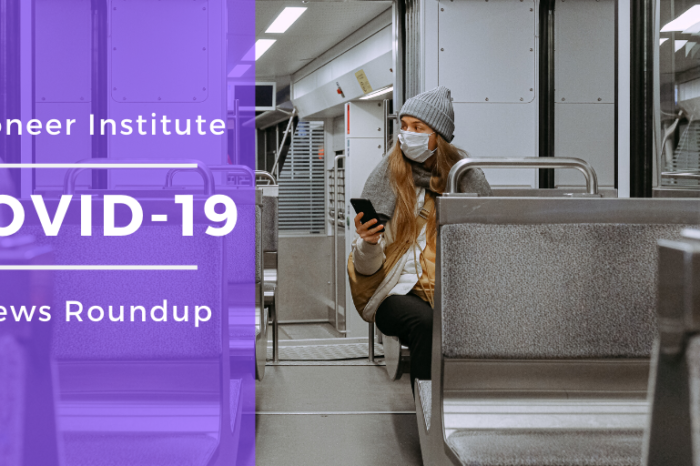COVID-19 Roundup from Pioneer: 90-day prescription refills?; Who has the power to re-open the economy?; Grading the Bay State in Online Learning; The T & COVID prevention; & more!
Pioneer staff share their top picks for COVID-19 stories highlighting useful resources, best practices, and questions we should be asking our public and private sector leaders. We hope you are staying safe, and we welcome your thoughts; you can always reach out to us via email: pioneer@pioneerinstitute.org.
Our Top Picks for COVID-19 Pandemic News:
Jim Stergios, Executive Director: Pioneer Legal Senior Fellow Jim McKenna and Mary Z. Connaughton have an excellent commentary on federal and state government power in the COVID crisis. Lots of good insights on the Commerce and Dormant Commerce Clause – and a reminder about the power of the people. AG William Barr makes many of the same points in this interview, though the AG is more focused on government power.
Coming soon! Pioneer has been covering some key pieces of the overall solution to addressing the challenges of COVID: things like telehealth, digital learning, standards of care in our hospitals, scope of practice regulations on nurses and other healthcare professionals, unemployment insurance funding, and hygienic standards at the MBTA, to name a few. This week, look for another super-timely COVID-related product:
- What to do when you re-open your business? Business leaders need to plan now. Pioneer understands the complexities, care, and concerns that go into that decision and its implementation. We are pleased to announce that in collaboration with the law firm of Verrill, Pioneer will soon release a practical guide for employers and commercial real estate managers to get employees back to work safely, and a checklist for minimizing or eliminating legal risks.
Coming kind of soon! The week of May 4th, we will be issuing two more timely products:
- For those interested in the future of transportation, we will be releasing the results from our “Telecommuting Tomorrow” survey (see below).
- For those concerned about violations of civil liberties during the pandemic, we will be offering to the public a “Respect My Rights” civil liberties hotline.
William Smith, Visiting Fellow in Life Sciences: The challenge of asymptomatic patients is discussed in the New England Journal of Medicine. And, has Sweden found a better way to handle COVID-19 by eschewing lockdowns?
Also from Bill: Some COVID-19 innovations should be here to stay: Less time commuting, more telemedicine, & more efficient “drive-thru” shopping. Another one? Fewer trips to the pharmacy – 90-day prescription refills – are an obvious improvement.
SURVEY: How will you look at commuting in the future? We’re asking over 30,000 people how their attitudes & habits will shift after COVID. Please be part of our work to understand our changing world – share your feedback, it takes only 2 minutes!
Our Picks for Public & Private Sector Best Practices:
Barbara Anthony, Senior Fellow in Healthcare: You can help end the COVID crisis – read about the contact tracing initiative, which aims to increase testing and provide resources for coronavirus patients.
Mary Z. Connaughton: From Pioneer author and attorney David Clancy – tips for small business owners on the most recent stimulus bill from the Wall Street Journal. Also, don’t forget to check out our interactive map of COVID cases in Massachusetts, updated with newly released data every week.
Jamie Gass, Director of PioneerEducation, wants to call attention to a couple news items:
- The Boston Globe profiles Massachusetts’ and Rhode Island’s differing approaches to virtual learning; however, it doesn’t mention that both states are over 20 years behind leading digital learning states, including Florida, Arizona, and Utah.
- Hear engaging interviews with two nationally-recognized digital learning gurus, Michael Horn and Julie Young, featured on Pioneer’s weekly podcast, “The Learning Curve.”
- One COVID-era casualty we are not lamenting is the closing of Achieve, Inc., announced this week. Achieve, Inc. has been a prime mover behind the inferior-quality Common Core ELA and math standards, the Next Generation Science Standards, and the now defunct PARCC testing consortium that have led to academic stagnation and decline for Massachusetts’ and America’s K-12 schoolchildren.
Questions for Our Public & Private Sector Leaders:
Andrew Mikula, Peters Fellow: How does the MBTA stack up against other transit agencies when it comes to COVID-19 prevention? Read our new report, and news coverage of it here, here, and here.
What’s the latest on unemployment? Greg Sullivan, Research Director, crunched the most recent numbers. Watch him on Fox 25 and read more coverage here.
POLL: Do you feel safe (from COVID exposure) riding MBTA subway, buses, or commuter rail now?
— Pioneer Institute (@PioneerBoston) April 25, 2020
Do YOU have interesting questions and/or articles to share with us? Please email us, or message us through our social media channels below!















